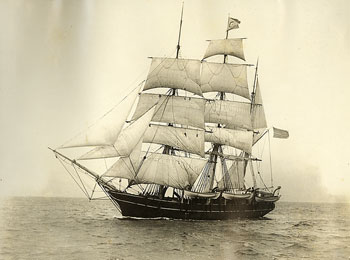Introduction
Imagine that your father's work took him away from home for three to four years at a time. For children of Yankee whalemen during the 1800s, that was their reality. Ever since the Globe of Nantucket had sailed into the open Pacific in 1818, American whale ships had begun to travel further and stay away from home for longer periods of time. These extended and more successful whaling trips improved the economy, but created an emotional "tug-of-war" for families of those involved.
Many of these ships had female names, but few had women on board. Everyone felt the effects of long-term separation. Most girls would never see the sights their brothers did as they traveled the globe in search of whales; nor would whaling husbands share life's passages with their wives such as the births of their children or the deaths of loved ones. Journals and logbooks, letters between mothers and sons, sisters and brothers, and especially between spouses, and even scrimshaw images, all document the longings that these families and loved ones endured.

Martha's Vineyard Museum